 W
WAnagnostaras was a Greek revolutionary, a leading member of the Filiki Etaireia, and later a general and War Minister of the Greek War of Independence. Anagnostaras is a nom de guerre, he was born as Christos Papageorgiou and signed as Anagnostis Papageorgiou .
 W
WOdysseas Androutsos was a hero of the Greek War of Independence.
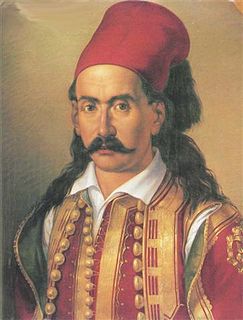 W
WMarkos Botsaris was a Greek general and hero of the Greek War of Independence and captain of the Souliotes. Botsaris is among the most revered national heroes in Greece.
 W
WSir Richard Church was an Irish military officer in the British Army and commander of the Greek forces during the last stages of the Greek War of Independence after 1827. After Greek independence, he became a general in the Hellenic Army and a member of the Greek Senate.
 W
WAdmiral Thomas Cochrane, 10th Earl of Dundonald, Marquess of Maranhão,, styled Lord Cochrane between 1778 and 1831, was a Scottish naval flag officer of the Royal Navy, mercenary and radical politician. He was a daring and successful captain of the Napoleonic Wars, leading Napoleon to nickname him Le Loup des Mers, 'The Sea Wolf'. He was successful in virtually all his naval actions.
 W
WHatzimichalis Dalianis was a commander of the Greek War of Independence (1821–1830) and revolutionary leader in Crete in 1828.
 W
WPanagiotis Danglis was a Greek chieftain during the Greek Revolution of 1821. He was born in Souli and was the son of Gogas Danglis. During the period of the Revolution, he was chieftain of Souli (1820–1822). He died in 1829 in Nafpaktos.
 W
WAthanasios Nikolaos Massavetas also known as Athanasios Diakos was a Greek military commander during the Greek War of Independence, considered a venerable national hero in Greece.
 W
WYannis Gouras was a Greek military leader during the Greek War of Independence. A cousin of Panourgias, he distinguished himself in the battles in eastern Continental Greece, but became notorious for his invasion of the Peloponnese during the Greek civil wars of 1824–25 and his murder of his former chief, Odysseas Androutsos. He was killed during the Siege of the Acropolis.
 W
WChristodoulos Hatzipetros was a Greek military leader during the Greek War of Independence, who became a general and adjutant to King Otto of Greece after Independence.
 W
WGeorgios Karaiskakis, born Georgios Karaiskos, was a famous Greek military commander and a leader of the Greek War of Independence.
 W
WNikolaos Kasomoulis was a participant in the Greek Revolution of 1821, and one of the main historical sources about it.
 W
WTheodoros Kolokotronis was a Greek general and the pre-eminent leader of the Greek War of Independence (1821–1829) against the Ottoman Empire. Kolokotronis's greatest success was the defeat of the Ottoman army under Mahmud Dramali Pasha at the Battle of Dervenakia in 1822. In 1825, he was appointed commander-in-chief of the Greek forces in Peloponnese. Today, Kolokotronis ranks among the most prominent figures in Greece's War of Independence.
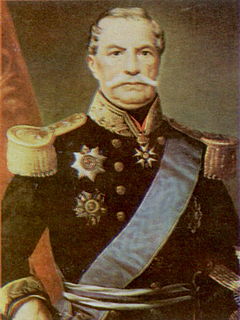 W
WAntonios Kriezis was a Greek captain of the Hellenic navy during the Greek War of Independence and a Prime Minister of Greece from 1849 to 1854. Kriezis was born in Troezen in 1796 to an Arvanite family. Literally translated from Albanian, his surname means "black head".
 W
WNikolaos Kriezotis was a Greek soldier who served as a leader during the Greek War of Independence in Euboea.
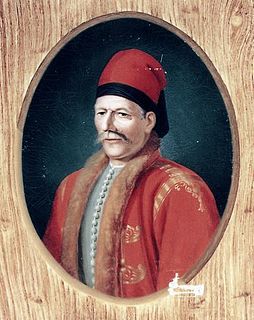 W
WLykourgos Logothetis, born Georgios Paplomatas, was a Samian who became the island's leader during the Greek War of Independence.
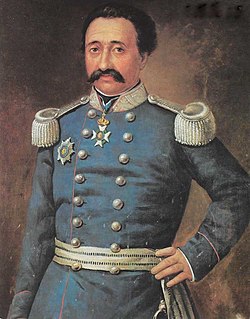 W
WAndreas S. Londos was a Greek military leader and politician. Born in Vostitsa in 1786, he was initiated into the Filiki Eteria in 1818, and was one of the first military leaders to raise the banner of revolt in the Peloponnese during the Greek War of Independence.
 W
WYannis Makriyannis, born Ioannis Triantaphyllou, was a Greek merchant, military officer, politician and author, best known today for his Memoirs. Starting from humble origins, he joined the Greek struggle for independence, achieving the rank of general and leading his men to notable victories, most notably the successful defence of Nafplio in the Battle of the Lerna Mills. Following Greek independence, he had a tumultuous public career, playing a prominent part in the granting of the first Constitution of the Kingdom of Greece and later being sentenced to death and pardoned.
 W
WKyriakoulis Mavromichalis (Greek: Κυριακούλης Μαυρομιχάλης, was a Greek revolutionary who fought in the Greek War of Independence.
 W
WVaso Brajević also known in Greece as Vasos Mavrovouniotis was a Montenegrin general, who played a significant role in the Greek revolution against the Ottoman Empire in 1821.
 W
WDimitrios Meletopoulos was a Greek military leader of the Greek War of Independence and later a politician.
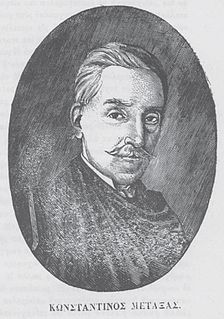 W
WKonstantinos Metaxas was a Greek fighter of the Greek War of Independence and politician from Cephalonia.
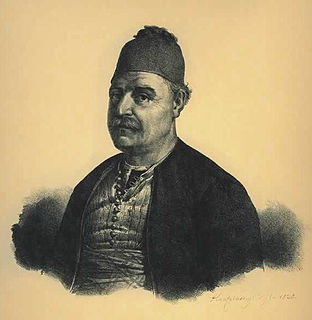 W
WAndreas Vokos, nicknamed Miaoulis, was a Greek admiral and politician who commanded Greek naval forces during the Greek War of Independence (1821–1829).
 W
WIoannis or Giannakis Notaras was a general of the Greek War of Independence. He was killed in 1827 during the battle of Phaleron.
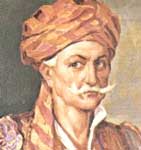 W
WDimitrios Panourgias/Panourias, a Greek military commander during the Greek War of Independence, was born Dimitrios Xiros in the village of Dremissa, Phocis.
 W
WEmmanouel Pappas was a prominent member of Filiki Eteria and leader of the Greek War of Independence in Macedonia.
 W
WNikolaos Petimezas was a Greek revolutionary leader during the Greek War of Independence, politician and officer of the Hellenic Gendarmerie.
 W
WEfstratios Pissas was a Greek revolutionary of the Greek War of Independence and an officer in the Greek Army.
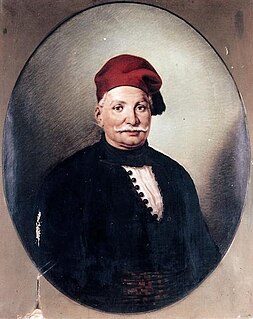 W
WGeorgios Sachtouris was a Hydriot ship captain and a leading admiral of the Greek War of Independence.
 W
WSpyromilios or Spyros Milios, was a Greek revolutionary, general and politician.
 W
WEmmanouil Tombazis was a Greek naval captain from Hydra, active during the Greek War of Independence, who was appointed Commissioner of Crete for the Greek provisional government in 1823–1824 and naval minister for a short period in 1828.
 W
WIakovos "Yiakoumakis" Tombazis was a merchant and ship-owner from the Greek island of Hydra who became the first Admiral of the Greek Navy during the Greek War of Independence against the Ottoman Empire (1821-1829). Tombazis' date of birth is not known but some historians suggest 1782. He was the son of Nikolaos Tombazis and brother of Emmanouil Tombazis. As a businessman, he was shrewd and was the first to build greenhouses in Greece. In 1818, he was initiated into the Filiki Eteria which was preparing the ground for the revolt. When the war broke out, his fellow islanders made Tombazis admiral of the fleet of Hydra. He took part in several clashes against the Sultan's Navy in the eastern Aegean and soon realized that the Greek warships, being mostly converted and armed merchantmen, could not face the Ottoman ships of the line in conventional combat. He therefore proposed the use of fireships instead, and sent Dimitrios Papanikolis to burn the Turkish frigate Moving Mountain anchored at Eresos on Lesbos. Tombazis met fellow Hydriote Andreas Miaoulis in 1822 and reportedly realized the man's military genius, proposing him as admiral of the fleet. After Tombazis withdrew from the admiralty, he continued to support the revolution with his ships and money. He died in 1829. The Greek destroyer Tombazis (D-215) was named for the Admiral in 1976.
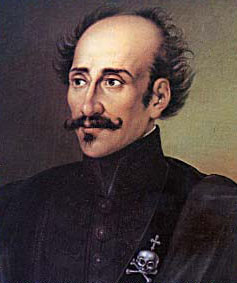 W
WAlexandros Ypsilantis was a Greek nationalist politician who was member of a prominent Phanariot Greek family, a prince of the Danubian Principalities, a senior officer of the Imperial Russian cavalry during the Napoleonic Wars, and a leader of the Filiki Eteria, a secret organization that coordinated the beginning of the Greek War of Independence against the Ottoman Empire.
 W
WDemetrios Ypsilantis was a member of the prominent Phanariot Greek family Ypsilantis, dragomans of the Ottoman Empire. He served as an officer in the Imperial Russian Army and played an important role in the Greek War of Independence. Ypsilantis was the brother of Alexander Ypsilantis, leader of Filiki Eteria.